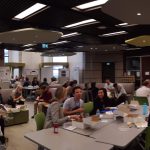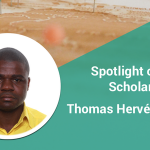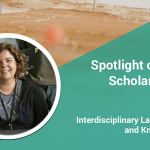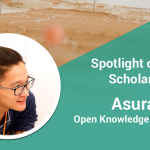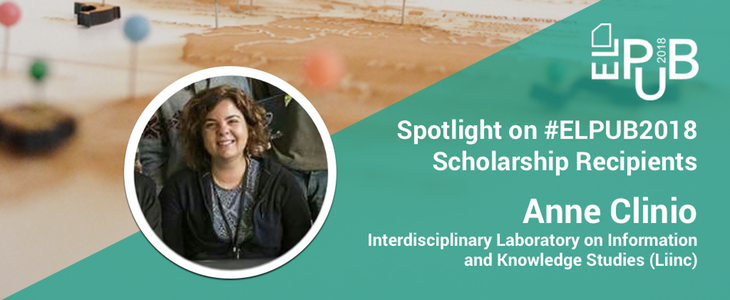
In the lead up to the ELPUB Conference, we will be featuring the #ELPUB2018 Travel Scholarship recipients on our blog. We would like to thank our Conference Partners – PLOS, OpenEdition, SPARC, FACETS Journal, UTSC’s Arts Culture and Media Department and Centre for Critical Development Studies, U of T Libraries, ACRL, Arcadia Fund, CARL, CRKN, Creative Commons, eLife, KULA Journal and Ubiquity Press – for making it possible to include more voices in the conversation.
In this post, we share a Question and Answer interview with Anne Clinio, a member researcher with Laboratório Interdisciplinar de Informação e Conhecimento / Interdisciplinary Laboratory on Information and Knowledge Studies (Liinc), Brazil. Anne will be co-presenting the paper “Beyond the dichotomy between natural and knowledge commons: reflections on the IAD framework from the Ubatuba Open Science Project” at the ELPUB Conference.
What are your research interests and how do they fit in with the theme of the ELPUB conference (Connecting the Knowledge Commons: From Projects to Sustainable Infrastructure)?
I am a young researcher interested in Open Science, focusing on the political/institutional aspects unfolded by new practices that tend to make the production and the communication of scientific knowledge synchronous. I entered this field by studying open laboratory notebooks because I was very intrigued with the idea of researchers allowing access and reuse of all “code” produced by them; not only those quite few selected experiments that are described on scientific articles as the foundations of matter of fact construction. The open laboratory notebooks research led me to study its adoption by a hard science discipline (Organic Chemistry) and citizen science initiatives that identify themselves as laboratories and combine professional experts and experience experts, scientific research and activism, in order to give existence to “new facts”, generally not recognized by publicly funded science and national states, so they can dispute the debate on the public sphere.
Later, I was part of Ubatuba Open Science team, sponsored by OSCDNet, in which I researched the mutual relationships between natural and knowledge commons in development issues, focusing on Institutional Analysis and Development (IAD) framework, developed by Elinor Ostrom and other researchers of Indiana School. I also researched citizen science initiatives in Latin America, aiming to understand our particularities and challenges since my previous research was basically done in Europe and EUA. Actually, I work at Oswaldo Cruz Foundation (public health) and I am a member of its Open Science Working Group, responsible for developing studies and pilot projects. We are now starting a collective and democratic debate, including public consultations, that will result in our open data policy.
I believe that the ELPUB Conference 2018 theme “From projects to sustainable infrastructure” give us the opportunity to continuously enlarge the open access definition, including other practices – such as open data, open labs, open hardware, citizen science – and think about sustainability in its political and institutional aspects that, along with technical infrastructures, can make the knowledge commons resilient and prosperous in time. For instance, what are the mechanisms that could guarantee that open perspectives do not amplify inequalities between countries that have different capacities of producing knowledge or processing data/information?
What are some of the specific challenges within your region/country with regards to infrastructures for open access?
Brazil is a global player in open access despite our continuous infrastructure challenges. Currently, we are already facing a “second opening wave” due to the progressive establishment by funders, agencies and scientific journals of open data practices as mandatory. Thus, increasing access to scientific knowledge on data level is already demanding a new culture between knowledge producers, new evaluation metrics, capacity building and technical infrastructures that combined must create a complex research environment, although our national R&D budget is decreasing year after year.
What do you hope are the outcomes of the ELPUB Conference?
I hope that by aggregating a very diverse range of participants, I will get in touch with rich experiences around the globe that will help me analyze, more profoundly, the relation between the open paradigm and the constitution of a knowledge commons.
Any other comments you’d like to make?
First of all, I would like to thank you for the opportunity to attend the conference through the travel scholarship. This is a rare, but very important, opportunity for a young researcher like me, to meet personally colleagues that share interests. Although the internet can help us a lot, there is nothing like spending a couple of days with peers to identify affinities. I am sure that we will not only learn from each other but also initiate collaborations that otherwise would be more difficult. I am also very glad to be part of a conference that has a code of conduct that explicitly says that discrimination and harassment will not be tolerated. Once more, thank you for the opportunity!
